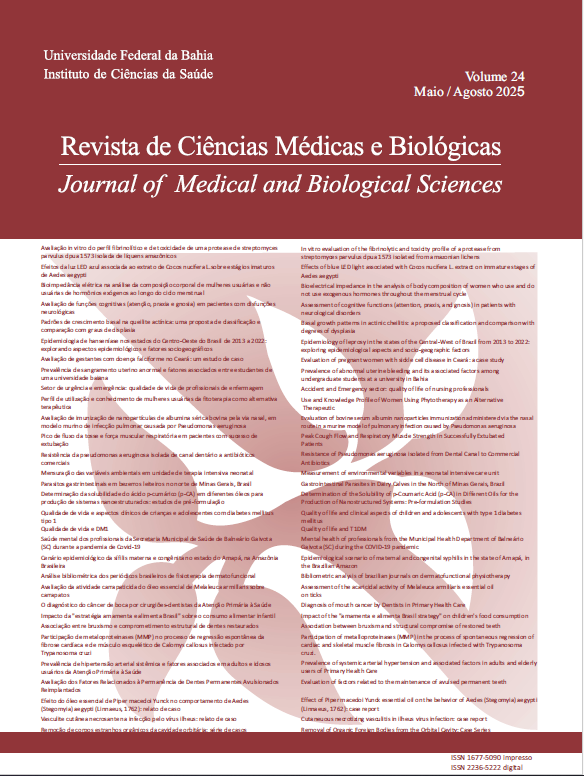Avaliação de imunização de nanopartículas de albumina sérica bovina pela via nasal em modelo murino de infecção pulmonar causado por Pseudomonas aeruginosa
DOI:
https://doi.org/10.9771/cmbio.v24i2.68470Keywords:
Pseudomonas aeruginosa, nanotechnology, bovine serum albumin, immunoadjuvantAbstract
Introduction: Pseudomonas aeruginosa is among the primary bacteria associated with nosocomial infections and antimicrobial resistance. Considering this, new approaches beyond the use of antibiotics are being developed to combat this pathogen. Nanotechnology has expanded substantially in recent years in terms of research and applications. Nanoparticles can be used as drug delivery systems and to improve the immunogenicity and stability of specific antigens. Bovine serum albumin nanoparticles loaded with Poly (I:C) (NPPI) exhibit adjuvant properties and are promising candidates for inclusion in the formulation of various vaccines. Objective: to evaluate whether bovine serum albumin nanoparticles containing polyinosinic:polycytidylic acid, associated with total proteins of P. aeruginosa, are capable of protecting mice immunized via the intranasal Route. Methodology: the nanoparticles (NPs) were synthesized by the coacervation method and analyzed for size, morphology, zeta potential, and polydispersity index. C57BL/6 mice were immunized intranasally with total P. aeruginosa proteins in the presence of NPPI using a prime-boost protocol. Immunized animals were challenged with the virulent P. aeruginosa PA14 strain, and weight loss, mortality rate, and lung alterations were assessed. Results: the NPPI exhibited morphology, polydispersity index, and zeta potential similar to empty nanoparticles produced only albumin (NPV). The immunizations did not induce weight loss in the animals and stimulated the production of serum anti-P. aeruginosa IgG antibodies. Animals immunized with the vaccine formulation (NPPI and total P. aeruginosa antigens) showed weight loss, mortality rate, and bacterial load similar to the control groups after P. aeruginosa infection. Conclusion: intranasal immunization route with the vaccine formulation did not provide protective effect against P. aeruginosa infection, indicating the need for studies to improve the immunogenicity of this adjuvant via the intranasal route.
Downloads
Downloads
Published
How to Cite
Issue
Section
License
Copyright (c) 2025 Journal of Medical and Biological Sciences

This work is licensed under a Creative Commons Attribution 4.0 International License.
The Journal of Medical and Biological Sciences reserves all copyrights of published works, including translations, allowing, however, their subsequent reproduction as transcription, with proper citation of source, through the Creative Commons license. The periodical has free and free access.


